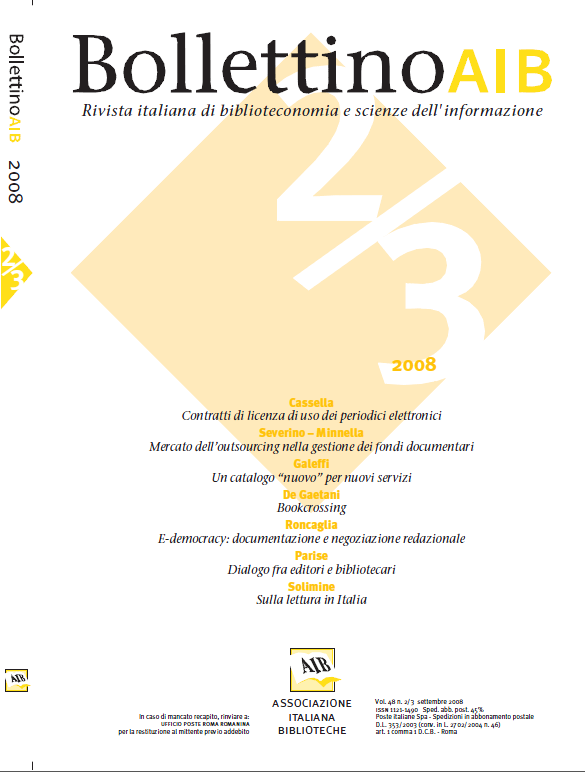The outsourcing market in the management of documentary collections
Main Article Content
Abstract
Following law n. 285/1978, in the Eighties, documentary collections, especially those in the possession of public libraries and archives, were subjected to the outsourcing of numerous services. To carry out these services, personnel employed with a temporary project contract was used. This phenomenon, as is well known, led to the birth of numerous organizations, often in the legal form of cooperatives, with library and archive professionalism, that for some decades organized and subjected to various forms of treatment a large part of Italian public documentary collections. There are hundreds of suppliers present on the Italian market able to offer numerous types of services to documentation centres.
In recent years however, the market seems to have changed dramatically: the more limited resources of the public administrations have drastically reduced investments and at the same time there has been a gradual - even if not always sufficient - availability of the collections and therefore a real drop in demand. The result is that a market that had led to the birth of numerous economic organizations based exclusively on public request, often with numerous dependents that were over a hundred or so, found themselves in a bottleneck.
In this regard, the authors carried out market research on behalf of the Biblionova cooperative, in the area of central Italy (Lazio and Abruzzo) to photograph the current public request for services to documentation centres and to intercept any new private request.
The investigation shows the existence, even if not particularly noticeable, of a private market interested in using external skills for managing their documentary collections. Most times this market segment appears to be at an early stage, especially with regard to the private sector, in the sense that although the collections are often well-organized and complex, it is rare they the benefits of their efficient organization is acknowledged or perceived.
It is likely that there is a potential market, but it should be defined in terms of demand, and the burden for the potential suppliers who wish to profit from this market is that of stimulating its awareness and growth.
It can therefore be stated that a way out for a public market for outsourcing services for documentary collections in constant soffocation is in the diversification of the clientele. The operators must be able to interact with a number of types of customer, developing project capacities able to perceive problems that are not yet clear in the actual requests of the buyer; above all operators must be able to transmit the economic value of their work and the benefit of their services. In two words: learn to sell.
In recent years however, the market seems to have changed dramatically: the more limited resources of the public administrations have drastically reduced investments and at the same time there has been a gradual - even if not always sufficient - availability of the collections and therefore a real drop in demand. The result is that a market that had led to the birth of numerous economic organizations based exclusively on public request, often with numerous dependents that were over a hundred or so, found themselves in a bottleneck.
In this regard, the authors carried out market research on behalf of the Biblionova cooperative, in the area of central Italy (Lazio and Abruzzo) to photograph the current public request for services to documentation centres and to intercept any new private request.
The investigation shows the existence, even if not particularly noticeable, of a private market interested in using external skills for managing their documentary collections. Most times this market segment appears to be at an early stage, especially with regard to the private sector, in the sense that although the collections are often well-organized and complex, it is rare they the benefits of their efficient organization is acknowledged or perceived.
It is likely that there is a potential market, but it should be defined in terms of demand, and the burden for the potential suppliers who wish to profit from this market is that of stimulating its awareness and growth.
It can therefore be stated that a way out for a public market for outsourcing services for documentary collections in constant soffocation is in the diversification of the clientele. The operators must be able to interact with a number of types of customer, developing project capacities able to perceive problems that are not yet clear in the actual requests of the buyer; above all operators must be able to transmit the economic value of their work and the benefit of their services. In two words: learn to sell.
Article Details
Section
Articles

This work is licensed under a Creative Commons Attribution-ShareAlike 4.0 International License.
